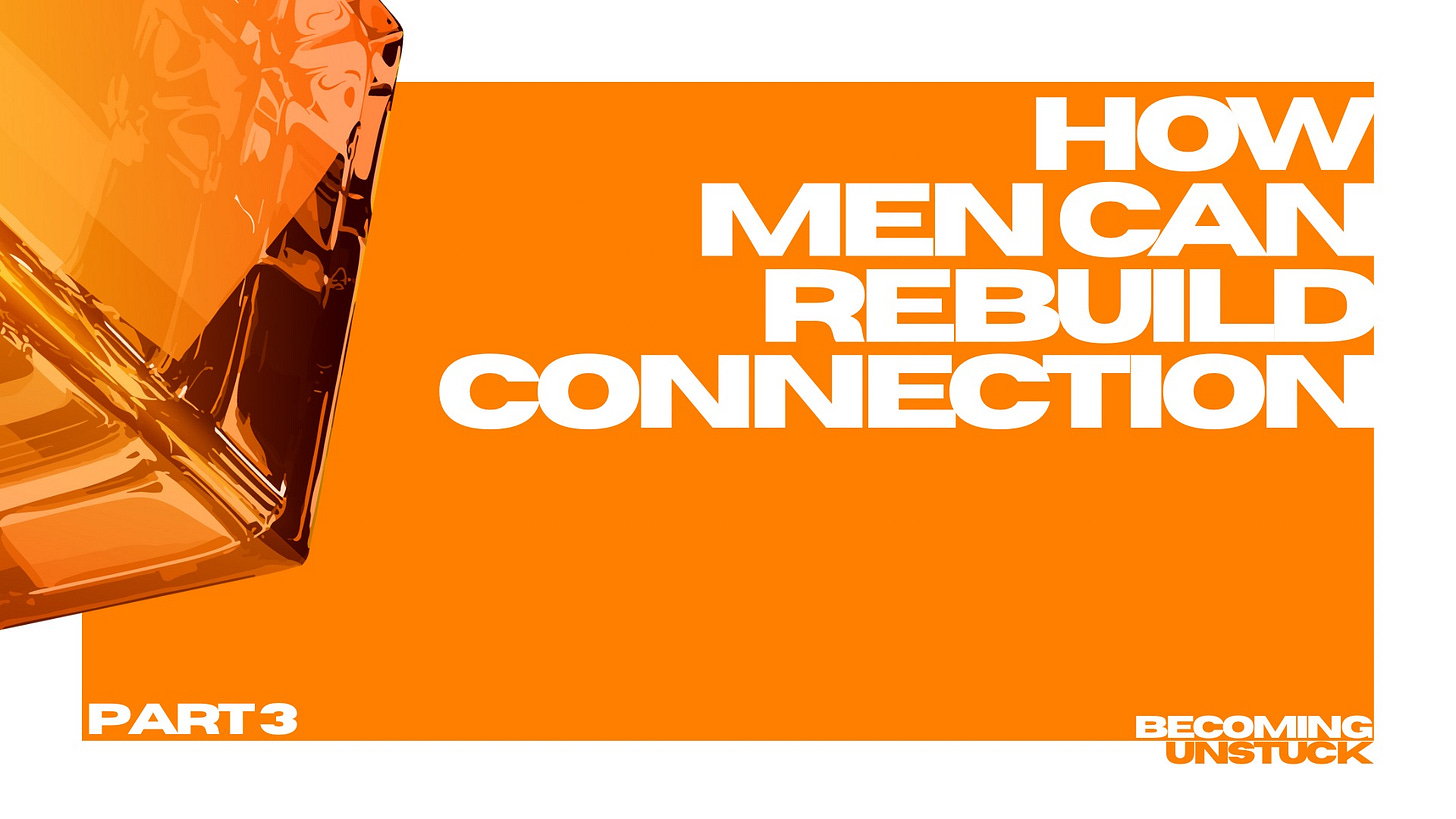So here we are for part 3 of our series why it’s so hard for men to connect today. If you want to catch up, read part 1 and part 2 here.
Considering we’ve already pin-pointed the problems men are facing today, I think it’s time to button this thing up once and for all. These last few have proven to be in tidbit demanding but alas, here we go with the final part of this three part series for men looking to be more connected. Up next, we’re going to be diving into three leadership tools that will help you be the best leader and director you didn’t even know you could be!
Men are disconnected—from others, and often from themselves.
When you face early emotional shutdowns while simultaneously shrinking adult relationship during this illusory world that pretends online connection is the same as personal connection you’re bound to have not questions than answers.
One of the worst parts about this is the fact that men will end up in unhealthy situations and eventually is extremely socially isolated situations. Sure we men like our solitude but let’s be real here, isolated men are at a 30% increased risk of mortality when compared to those with more social ties. Men’s with higher social ties are able to find healthier outlets and have a stronger support system when things go wrong.
Here’s more data—Depression among disconnected men tends to be at 2-3X higher than those with social circles.
These two points alone should be more than enough to raise concerns on the impact of disconnected men, and we still haven’t started talking about the cardiovascular issues that arise when isolated men don’t have community oriented activities to decompress from the daily demands.
If you have gotten this far and you’re not a man, you might be wondering what the hell do I do with this information? Well I encourage to think about the men in your life and what they might be going through. Maybe share this with them.
Back to this…
So then what does reconnection actually look like for men? Only if we decide we cleanly tk do something about or rather YOU WANT TO DO SOMETHING ABOUT IT for you and those around you.
Connection Has to Be Chosen
AI relationships are now becoming a very real thing among men. Men are creating AI chatbots that replace the need for a real companion while finding confidence in these pseudo-relationships. This is happening at a higher rate and has been raising concerns about men’s ability to “stick it out” or handle rejection, considering many chatbots are being designed by men to be more agreeable (that’s a whole other can of worms). Relationships where agreeableness is at higher levels mean they can easily become addictive because of the constant positive feedback loop that can be achieved from AI. This addictive loop has now been studied and analyzed by countless organizations. Even people like @ChamathPalihapitiya (see his substack here), former Vice President of User Growth at Facebook was giving a talk at Stanford University, when he said “I feel tremendous guilt. I think we all knew in the back of our minds, even though we feigned this whole line of “there probably aren’t any really bad unintended consequences.” I think in the deep recesses of our minds we kind of knew something bad could happen, but I think the ways we defined it were not like this.“
I mean, consider the amazing work of
on AI these recent months. This guy is leading the charge here.THIS IS A VERY REAL PROBLEM AND MEN ARE SUFFERING BECAUSE OF IT.
Friendships don’t “just happen” they required intention, time and effort to work.
Here’s a scary point however, and a point that truly warrants your review.
In recent ad campaign for friend.com has been seen obnoxiously pestering commuters in NYC. The proposition? If you’re lonely, buy an AI friend for $129 dollars.
See that red necklace Aaron’s her neck? That’s it.
While this seems cool and trendy, it’s not the right way to solve the lack of connection problem we face.
To fix the connection problem we have to say yes to connection.
We have to be vulnerable. We can’t let other men make those decisions for us.
And we don’t need to buy a fancy AI necklace to make it happen.
Second: We Need Places That Make Brotherhood Possible Again
Here’s the truth: men don’t typically connect by sitting across from each other and spilling feelings—men bond through doing. Through shared experiences, side-by-side effort, challenge, and even a little risk.
Want to rebuild connection?
Start here:
Join a men’s group (yes, even if it feels weird at first).
Say yes to that pickup game, run club, or group hike.
Start a monthly dinner with no phones and real conversation.
Go to therapy or coaching—not because you’re broken, but because you’re human.
Create your own space if one doesn’t exist.
Brotherhood isn’t built on convenience. It’s built on courage and consistency.
Third: We Have to Model It—Out Loud
You want the next generation of men to be better? To love deeply, lead well, and live whole?
Then show them what that looks like.
Tell your friends you love them.
Ask deeper questions.
Talk about what actually matters.
Apologize when you mess up.
Let people see you trying.
Because that’s how the script changes—not by yelling at the system, but by rewriting it in real time.
Here’s the Hope
You’re not alone in feeling alone.
And connection isn’t as far away as it feels.
It’s one brave conversation.
One honest moment.
One consistent meetup.
One group text that turns into a ritual.
One man deciding to go first.
And then another.
And another.
Until the silence is replaced with something deeper:
Belonging. Brotherhood. Real strength.
A Final Word
This series wasn’t written as a critique—it’s a call.
Because I believe this generation of men is capable of more.
Not just more achievement.
More depth. More presence. More freedom.
The kind of freedom that only comes when you finally take the mask off and let someone see you—really see you.
That’s the kind of man I want to become.
And if you’re reading this…
I think you do too.
Let’s build it—together.
TTYL




